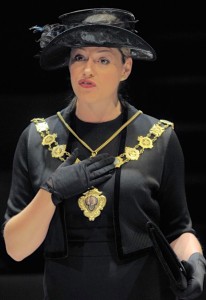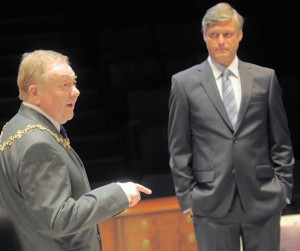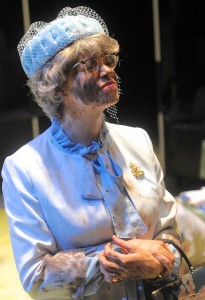Alan Ayckbourn’s latest play, A Brief History of Women, has the recognizable hallmarks of the best plays in his vast repertoire. His knack at dissecting and satirizing British society is unparalleled (Anglophiles will particularly enjoy them, but they’re accessible to all). There is the great British obsession with class, along with Ayckbourn’s distinctive mastery of exits and entrances familiar from The Norman Conquests, Communicating Doors, and the double bill of House and Garden. There’s poignancy, too, since the new comedy—the title is a bit of misdirection—is an homage to one man’s affecting life.
Home Town Unpleasantries
Alan Ayckbourn’s plays have been a fixture of the Brits Off Broadway Festival for several years. This year, along with a revival, the festival is presenting the world premiere production of Hero’s Welcome, first seen at Ayckbourn’s own Stephen Joseph Theatre in Yorkshire, England, and now on an international tour.
Ayckbourn, the author of 79 plays, may be one of the most underrated playwrights alive. Many of his works are comedies, but there are often dark underpinnings. From his classic Absurd Person Singular (1975), in which a hilarious attempted suicide takes up the entire second act, to Arrivals & Departures (2013), one of his darkest, he has been a masterly commentator on British society in plays that range from science fiction (Comic Potential, Communicating Doors) to astute social observation (Things We Do for Love, Absent Friends)—always using comedy to make his points.
Unlike many Ayckbourn plays, Hero’s Welcome feels a bit long and complicated. Opening with Elgarian music and a TV interview, it concerns a soldier named Murray (Richard Stacey) who has returned to his small home town to take up residence with his new wife, a woman from the unidentified foreign country in which he conducted his heroic deeds. Her name is Madrababacascabuna, but she goes by Baba. The interview elicits a confession from Murray that he left under a cloud; he was “a bit of a tearaway,” as his interviewer puts it. As Ayckbourn’s play unfolds, it becomes clear that the heroes in the play are the three wives we see; their husbands are cruel or ineffectual. The mayor of the town, Alice (Elizabeth Boag), was abandoned at the altar by Murray. Now she is matched with a kind-hearted duffer named Derek (Russell Dixon), who plays with toy trains all over their house, and who describes himself as a “consort.”
Murray’s old mate Brad, meanwhile, is married to Kara. But the upper-class, wealthy Brad refuses to acknowledge that he and Murray were close childhood friends. The competitive Brad is, in Wodehousian terms, a blackguard. He repeatedly insults Charlotte Harwood’s cheery, giggly Kara, and she accepts it.
Murray hopes to resurrect the family business, an old hotel called the Bird of Prey. It’s listed as historically important but is rundown. Moreover, Murray’s father couldn’t pay the taxes on it, and now it belongs to the town council, and Alice is bent on tearing it down. Although she’s not vicious, it suits her impulse for revenge to prevent Murray’s buying back the property.
Ayckbourn’s play is about the public faces people put on that conceal their private personalities, and how the past shapes those personalities. Just as Kara remains chirpy in order not to recognize Brad’s cruelty, Brad himself is cruel in order to forget his lack of courage in throwing over a woman he loved in the face of his parents’ threat of disinheritance. Murray, meanwhile struggles with some bad behavior of his own. In addition to jilting Alice, his heroism is a sham.
It’s often unwise for an author to direct his own work, but in the past Ayckbourn has proved the rare exception to the rule. This time, though, the play feels a bit longer than it need be, and a bit overstuffed with incident. What a different director might have done to tighten it is uncertain, but the actors, at least, are outstanding. Stephen Billington’s Brad is all surly arrogance, and Boag’s Alice is stiff and competent, but frosty from a life of suspicion sparked by her jilting. Dixon is a comic pleasure, and Derek’s rising to his Lochinvar moment, when he excoriates Brad, is deeply satisfying. Stacey’s Murray is perhaps the least interesting character—he’s not the hero of the title, since it’s an ensemble piece—but he conveys decency, modesty and honest regret.
Still, it’s Evelyn Hoskins’ Baba who is first among equals. Learning English slowly and painstakingly, bravely facing a future in as a refugee, ultimately befriending Kara and confronting Alice, Baba’s journey becomes the play’s real focus. Early on, after she has met the people from Murray’s past, she asks him: “Why they hate you?” Like Winnie in the Ayckbourn masterpiece My Wonderful Day (2009), she knows the truth that others cannot see.
Two Alan Ayckbourn plays, Hero’s Welcome and Confusions, run in repertory through July 3 at the Brits Off Broadway Festival at 59 East 59 St. between Park and Madison. Tickets are $70 but two-show packages are available. For information, visit 59e59.org.
Truths Be Told
The British have a way of turning the everyday inside out in a humorous way. Confusions, written and directed by Alan Ayckbourn, and part of the Brits Off Broadway festival, is a masterly series of vignettes in which characters try hard to maintain normalcy and decorum, but when a single truth is revealed through an ill-timed but dramatically funny mishap, a more personal and meaningful internal world is uncovered. The cast of five—Elizabeth Hoag, Charlotte Harwood, Stephen Billington, Richard Stacey and Russell Dixon—skillfully play a handful of characters.
In “Mother Figure,” Lucy (Elizabeth Hoag) is a harried and all-consumed mother who doesn’t pay much attention to the ring of the phone, the doorbell, and thus the outside world. When her neighbors, Terry (Stephen Billington) and Rosemary (Charlotte Harwood), stop by to check on her for her husband who is away, she can’t seem to carry on a simple conversation. Instead, she offers juice to Rosemary and milk to Terry, to which he defiantly claims he “hates the damned stuff.” She counters: “I’m not going to waste my breath arguing with you, Terry. It’s entirely up to you if you don’t want to be big and strong.” Terry doesn’t have a clue how to respond. When Terry drinks all of Rosemary’s juice and then insults her, the moment uncovers some bigger marital problems. Lucy, undaunted, doesn’t believe anything can’t be solved with simple directives, and orders Terry to say he’s sorry to Rosemary. Reduced by her stern mother figure, they kiss her good-night before they leave, and when she tells them to hold hands while crossing the street, they oblige, and one feels all has been restored.
“Drinking Companion” shows Lucy’s husband, Harry (Richard Stacey), a traveling salesman who feels his wife is happier when he’s away. Desperate to connect with another adult, particularly a woman, he makes a show of being friendly with Paula (Charlotte Harwood) at the hotel bar. He struggles to pump himself up when he talks about his line of haute couture and colors, but all he really wants is companionship. As he grows drunker he tries not to make advances, but puts his key on the table, and says, “I’m going to leave it there. I’m not going to try and embarrass you, you see, but its there. If you want to pick it up, it’s there. Entirely up to you.” When he goes out to call a cab, Paula and her friend slip away. Poor Harry.
Ayckbourn also captures how communication is about energy and not necessarily words. In “Between Mouthfuls” two separate couples dine at a restaurant under the pretense of having a pleasant evening out. However, their conversations soon turn to jealousies. As things intensify, they continue their argument even when the sounds of their voices drop away. Their jaws, working out the tension around the words, still speak volumes.
Sometimes a small reveal can have big consequences. This is especially true in “Gosforth’s Fete” in which Milly (Charlotte Harwood) is setting up for tea in a tent to celebrate the visit of an important patron. There are many problems that day, including a mute loudspeaker. Gosforth, the organizer of the event and local pub owner, tinkers with the loudspeaker during a conversation with Milly. Unbeknownst to them, he gets it to work at the same time that Milly reveals her news. It’s a cringeworthy yet funny moment because it’s the kind of timing you know can happen but wish it wouldn’t. Milly’s fiancé Martin (Stephen Billington), a Boy Scout leader, is so overwrought from the inadvertent revelation he gets drunk on sherry. In the end, Milly sizes him up and declares that she doesn’t like his baggy shorts anymore, anyway.
Capping the evening, “A Talk in the Park” brings the ensemble together. Each character wants to enjoy the park alone for various, personal reasons. With only four park benches and five characters, one is bound to join another. In a round robin of sorts, one sits next to another, thus intruding on their solitude. However, as much as these people want to be left alone, they don’t hesitate to complain about the person who was “talking too much” to the occupant on the next bench when they move. It turns out they can’t help talking too much as well, and thus the initial occupant moves to the next bench. And so the circle continues. The scene captures both the inside and outside aspect of our desires to be alone, yet at the same time to share and unburden the troubles we carry in our hearts and minds.
Confusions by Alan Ayckbourn is part of the Brits Off Broadway festival and is playing through July 3 in repertory with Hero's Welcome at 59E59 Theaters (59 East 59th St. in Manhattan). Tickets are $70 and may be purchased by calling Ticket Central at (212) 279-4200 or visiting www.59e59.org, where the repertory schedule may also be seen.











